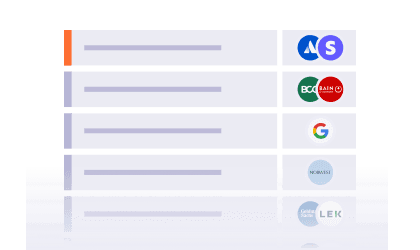Fellowship vs Internship: What's the Difference & How to Land One
Fellowship vs internship: Understand which one fits your goals and how to craft a standout application for each.
Posted July 3, 2025

Join a free event
Learn from top coaches and industry experts in live, interactive sessions you can join for free.
Table of Contents
Applying for an internship or fellowship can be a monumental step forward in your professional career, but it's important to know the difference and identify which one is right for you. This article will discuss fellowships from academic institutions, research organizations, government, and civic groups. This guide also covers internships, which are a great way to get industry experience, including useful tips to create strong applications and secure these career growth opportunities.
What’s the Difference Between Internships and Fellowships?
Internships and fellowships are both valuable opportunities for professional growth, but they differ in purpose, structure, and focus. Internships are typically short-term positions (often for students or recent graduates) that provide hands-on experience in a specific field, with a focus on learning practical skills and gaining industry exposure. Fellowships, on the other hand, are often more specialized programs aimed at advanced study or research. Fellowships may include funding, mentorship, and academic or project-based work, and are usually geared toward professionals or postgraduate students looking to deepen expertise in a particular area. Let’s further break down some of these differences.
Focus and Research Purpose
Fellowships emphasize professional development and scholarly research, typically revolving around a particular company, specific project, or research initiative. Fellows often engage in more specialized training programs aimed at developing advanced competencies. Internships focus on gaining hands-on industry experience and practical skills.
Target Candidates
Fellowships typically target post-graduate students, researchers, or professionals with advanced degrees. Most fellowship programs require at least a bachelor's degree, with some demanding master's or doctorate degrees. Aside from the academic background, candidates may even need to submit writing samples. In contrast, internships are more accessible, welcoming post-graduate students, undergraduate students, and even high school students.
Duration and Structure
Fellowships typically span a longer period, ranging from several months to two years of full-time work. These positions offer more independence and flexibility in the work structure. Internships, however, generally last between one and three months, with options for part-time arrangements that accommodate academic schedules.
Application Process
The application requirements of internships and fellowships reflect the programs' different natures.
Fellowship Applications:
- Project proposals
- Extensive documentation
- Writing samples
- Letters of recommendation
- Transcripts
Internship Applications (similar to entry-level job applications):
- Resume
- Cover letter
- Basic qualifications
- Professional references
For the best possible resumes, read: An Expert’s Guide to Resumes: Five Tips to Make You Stand Out.
Compensation and Benefits
Fellowships and internships differ significantly in their compensation structures and benefits, reflecting the unique nature of each experience.
Fellowships typically provide fellows with a fixed stipend rather than an hourly wage. This stipend supports the fellow's project-based or research-oriented work, often designed to foster independence and long-term impact. Beyond financial support, fellowships frequently include additional benefits such as:
- Paid Time Off: Many fellowships provide paid time off, allowing fellows to take breaks without interrupting their projects or impacting their stipend.
- Insurance Coverage: Health and other insurance options are often part of fellowship packages, especially for those lasting six months or more.
- Professional Development Funding: Fellows may receive funding for attending conferences, workshops, or courses to enhance their expertise and networking opportunities.
- Holiday Benefits: Some fellowships offer paid holidays, mirroring the benefits found in full-time employment and supporting work-life balance.
Internships, on the other hand, may offer different forms of compensation, including hourly wages, a monthly stipend, or academic credit, depending on the role and industry. While many internships are paid, others, especially in nonprofits or academic settings, might be unpaid, focusing instead on providing valuable hands-on experience and professional networking opportunities. Internships are often a stepping stone to future employment, allowing interns to gain practical skills, build their résumés, and potentially secure job offers after completion.
Key Takeaways
- Internships and fellowships serve different purposes: internships are geared toward building hands-on skills and gaining industry exposure, while fellowships focus on specialized research or project-based work, often in a more academic or professional context.
- Fellowships are typically aimed at advanced students or professionals, requiring a higher level of academic or professional background, whereas internships are more widely accessible, including to high school and undergraduate students.
- Internships are generally short-term, lasting a few months and fitting around academic schedules, while fellowships often require a longer commitment, providing more independence and flexibility in structure.
- Fellowship applications demand more detailed documentation, such as project proposals and writing samples, reflecting their focus on specialized work, while internship applications are simpler, similar to entry-level job applications.
Types of Fellowships
Fellowships provide specialized training, research opportunities, and professional growth in various fields, benefiting individuals, organizations, and society. Here are some common types of fellowships:
Academic Fellowships
Academic fellowships are merit-based awards that support students financially, helping them pursue advanced degrees or specialized studies. These awards often cover tuition, healthcare, and sometimes even student loan assistance. Typical awards range around $25,000 for a 9-12 month period, aimed at master’s and doctoral candidates.
Examples:
- Rhodes Scholarship: Offers full financial support for students to pursue a degree at the University of Oxford.
- Fulbright Program: Provides grants for individually designed study/research projects or for English Teaching Assistant Programs.
- National Science Foundation (NSF) Graduate Research Fellowship: Supports graduate students in NSF-supported science, technology, engineering, and mathematics disciplines.
Professional Fellowships
Professional fellowships target mid-career practitioners, typically between 32-45 years old, looking to advance their careers. These fellowships offer a mix of curriculum-based learning, hands-on experiences, and peer knowledge exchange, providing participants with career-enhancing support and personalized guidance.
Examples:
- Hubert H. Humphrey Fellowship Program: Brings professionals from designated countries to the U.S. for a year of graduate-level study and professional development.
- Eisenhower Fellowships: Provides mid-career leaders with a customized program to enhance their professional capabilities.
- Harvard Advanced Leadership Initiative Fellowship: Aims to prepare experienced leaders to take on new challenges in the social sector.
Research Fellowships
Research fellowships support scientists and researchers across a range of fields, particularly in science, technology, engineering, and mathematics (STEM). These fellowships aim to foster innovation and drive scientific discovery. Research fellowships are valuable experiences, with 41% of professionals equating volunteer research experience through fellowships with paid work experience.
Examples:
- Marie Skłodowska-Curie Actions: Offers grants to researchers at all stages of their careers and encourages transnational, intersectoral, and interdisciplinary mobility.
- Sloan Research Fellowships: Awarded to early-career scientists and scholars of outstanding promise in recognition of distinguished performance and a unique potential to make substantial contributions to their field.
- National Institutes of Health (NIH) Individual Fellowships: Provide support for research training in biomedical, behavioral, or clinical sciences.
Pros & Cons of Fellowships
Fellowships offer unique opportunities for professional and personal growth, but they also come with specific challenges. Understanding these benefits and limitations can help you decide if a fellowship aligns with your goals and needs.
Pros
The focus is on professional development.
Fellowships provide structured training, hands-on learning, and exposure to industry experts, helping participants build essential skills in a supportive environment. Many fellowships also include mentorship, giving fellows the chance to receive tailored guidance from experienced professionals who can help shape their career path. These programs are designed to deepen expertise, offering participants a significant boost in specialized knowledge that’s often hard to gain through regular job roles.
They (usually) provide financial support.
Most fellowships offer stipends or funding to help cover living expenses, tuition, or professional costs. This financial backing can ease the burden of pursuing specialized study or research and allows fellows to focus fully on their projects without financial distractions. However, it’s important to carefully review each fellowship’s funding structure to ensure it aligns with your financial needs, as the level of support varies.
There are more opportunities for networking.
Many programs foster a community of like-minded professionals, creating a network that can be invaluable for career advancement. Fellows often connect with alumni, mentors, and leaders within their field, forming relationships that extend beyond the fellowship period. These connections can open doors to new roles, collaborative projects, or leadership opportunities.
They can be strong catalysts for career advancement.
By offering structured growth in specialized fields, fellowships can help individuals transition to new roles, pursue leadership positions, or deepen expertise that may be highly valued in their industry. This focused development positions fellows to leverage their experience when pursuing future opportunities, giving them a competitive edge in their field.
Cons
The application processes can be competitive.
Fellowships are highly selective, often requiring extensive applications that include essays, project proposals, recommendations, and sometimes interviews. The preparation required can be time-intensive, and candidates should be ready to dedicate considerable effort to stand out in the applicant pool.
They require a substantial time commitment.
Fellowships are often full-time and can last from a few months to a few years, which may conflict with ongoing work, academic obligations, or personal responsibilities. This level of commitment means fellows should carefully consider whether they’re ready to dedicate the required time and energy to a focused program without impacting other priorities.
They are often not very hands-on.
While fellowships often focus on research, academic pursuits, or project-based work, they may not provide as much hands-on, day-to-day industry experience as internships or entry-level positions in a typical work setting. This can be a drawback for individuals seeking practical exposure to standard business operations, as fellowship work may not fully mirror the real-world responsibilities or pace of industry roles. This could require fellows to adapt or pursue additional experience to bridge any practical skills gap once the fellowship ends.
Types of Internships
Internships provide students and early career professionals with the skills and experience they need to start their careers off strong. Recent data shows that students who complete paid internships have better career prospects – 65.4% of seniors receive job offers before graduation.
Academic Internships
Academic internships are often tied to university or college requirements, allowing students to receive academic credit while gaining real-world experience in their field. These internships are frequently found in nonprofit and research institutions, where college students can explore their interests further. Academic internships are a great fit for those in master’s and doctorate programs who seek to apply classroom knowledge in a professional work environment.
- Example: The University of Melbourne offers research internships where graduate researchers engage in research and development activities with external organizations, typically lasting 3 to 6 months.
Professional Internships
Professional internships are ideal for those who want to gain hands-on experience in a professional work environment related to their field of study. These internships are usually more structured and rigorous, providing training in areas like finance, business operations, and clinical research. Professional internships are particularly valuable for students looking to enter competitive fields after graduation, as they often lead to full-time positions.
- Example: The Josef Korbel School of International Studies offers internships with organizations like the U.S. Department of State and the United Nations, providing students with professional experience in international relations.
Research Internships
Research internships offer a unique experience for those interested in academic or scientific careers, especially in fields that require advanced degrees like master’s or doctorate programs. In these internships, students work with data collection, analysis, and experiment design. Research internships are commonly found in university labs and a public service jobs directory, helping students gain skills needed for doctorate programs or other research-intensive roles.
- Example: Pomona College offers a Summer Undergraduate Research Program (SURP), where students receive stipends to conduct research with professors or pursue independent projects.
Pros & Cons of Internships
Pros
They provide hands-on industry experience. Internships are structured to give interns real exposure to day-to-day operations within a specific field, allowing them to work on actual projects, observe industry practices, and develop foundational skills. This direct experience is especially valuable for understanding workplace expectations and applying academic knowledge in practical settings.
They are often a pathway to full-time employment. Many companies use internships as a recruitment tool, evaluating interns as potential full-time hires. Completing an internship successfully can lead to a job offer or future employment, particularly if the intern demonstrates a strong work ethic, cultural fit, and relevant skills.
They help you build a strong resume.
Completing internships demonstrates to future employers that you have relevant industry experience, making you a more competitive candidate for job applications. Listing internships on your résumé shows initiative, a commitment to your field, and an understanding of real-world work environments, all of which can boost your appeal to hiring managers.
Cons
Some are unpaid or provide limited financial compensation. While some internships are paid, many—especially in nonprofits, startups, or competitive industries—offer little to no financial support. This can make it challenging for interns to cover living expenses, especially if the internship is in a high-cost area.
They often lack structured mentorship. Unlike fellowships, which frequently provide formal mentorship, internships can vary widely in the support and guidance offered to interns. Some internships may leave interns with minimal supervision or feedback, which can limit growth and make it harder to navigate challenges effectively.
They can be limited in scope. Interns may be assigned narrowly defined roles, focused on a specific task or area, which can restrict their exposure to broader industry functions or skills. This limited scope may mean less overall learning and a narrower understanding of the field.
How to Land a Fellowship or Internship
Landing a prestigious fellowship or internship demands strategic planning and careful execution. Candidates succeed a lot more when they start networking one full year before application deadlines.
1. Research opportunities
Candidates should employ multiple channels to find the best possible opportunities. LinkedIn has emerged as a game-changer that offers advanced search tools to help candidates find highly competitive programs and connect with industry professionals. Students who attend career fairs and information sessions one year before applying have a higher chance of securing positions. Also, take advantage of your networks and the fellowships that your connections may know of.
2. Prepare the strongest possible application
- Polish Your Résumé to Perfection: Limit your résumé to one page, focusing on experiences and skills that directly relate to the internship or fellowship. Highlight specific achievements, use active language, and quantify results whenever possible. Carefully tailor your résumé to the role by reviewing the program description and emphasizing experiences that showcase the skills they are seeking.
- Request Targeted Letters of Recommendation: Choose recommenders who know your strengths well and can speak to qualities relevant to the program. Aim for a mix of professors, employers, or mentors who can provide diverse perspectives on your skills. Provide each recommender with specific examples or highlights they might include, making it easier for them to tailor their letters. Be sure to give them ample time to complete the letters thoughtfully.
- Double-Check All Supporting Documents: Submit only error-free documents, including transcripts, certifications, and any supplementary essays. Even minor mistakes can leave a negative impression, so proofread thoroughly. Ensure all documents are formatted according to the program’s guidelines to demonstrate attention to detail and professionalism.
- Prepare for Potential Interviews Early: Some programs require an interview as part of the application process. Review typical questions and practice responses that emphasize your strengths, relevant experiences, and how this opportunity aligns with your career goals. Consider scheduling a mock interview with a career advisor or mentor to receive constructive feedback and improve your confidence.
3. Prep for interviews
Preparing for an internship or fellowship interview requires targeted preparation, a clear understanding of the program, and a polished, authentic presence. Make sure you have heavily researched the program, including its goals, values, and structure. For fellowships, focus on their research objectives or desired skills, while internships may require an understanding of specific projects and the work culture. This understanding will help you align your answers with the program’s mission and demonstrate genuine interest.
Use specific examples from past experiences to show your fit for the role. Choose 2-3 key stories that highlight relevant skills and achievements, structured with the STAR method (Situation, Task, Action, Result) to make your responses clear and impactful. Additionally, ask insightful questions about the program's structure, mentorship, or success traits, demonstrating both your preparation and eagerness to contribute. Good questions can really help you stand out in the interview.
Finally, professionalism is essential throughout the interview process. Dress appropriately, maintain a respectful and positive tone, and pay attention to details like active listening and eye contact. After the interview, send a thoughtful thank-you email to reinforce your interest and leave a positive impression.
For the next steps, read:
- How to Nail “Tell Me About a Time…” Interview Questions
- 10 Career Development Questions to Ask Your Boss
- How to Negotiate Your Salary – With Example Emails
- 10 Thought-Provoking Questions to Ask a Career Coach
- An Expert’s Guide to Resumes: Five Tips to Make You Stand Out
4. Leverage your network and mentors
Meaningful professional relationships play a significant role in long-term success. The best time to network is when immediate results aren't needed. Successful candidates often:
- Reconnect with alumni from your program: Alumni who’ve made it into consulting can be a goldmine of insight and advice. Don’t hesitate to reach out for an informal chat—they’ve been in your shoes and often enjoy helping newcomers. You can gain practical tips on breaking into consulting, and sometimes, they’ll even point you toward job leads or internal referrals.
- Get involved in industry events and webinars: Attending industry events isn’t just about learning; it’s a chance to connect with professionals who share your interests. After an event, drop a friendly message to a speaker or someone you found insightful. A quick, genuine note can be the start of a meaningful connection.
- Find mentors who really get you: Look for mentors with experience in consulting who align with values and enhance future career prospects. It can be a professor, a senior colleague, or a former intern supervisor. Regularly update them on your progress, seek their advice, and get feedback on your challenges. A mentor invested in your growth is invaluable.
- Build relationships well before you need them: Networking is easier when you’re not rushing toward a job deadline. Take time to connect, stay active on LinkedIn, comment thoughtfully on industry discussions, and share articles that interest you. This way, when it’s time to apply, you already have established relationships, and they’re more likely to help you.
- Ask for referrals when appropriate: Many consulting firms value referrals from trusted sources, which can help you get noticed. If you’ve built a good connection, don’t be afraid to ask if they’re open to referring you. It can make a huge difference in getting past the resume screen and straight to an interview.
Investing time in these genuine connections makes all the difference in the consulting world, helping you stand out to recruiters and giving you the confidence to navigate the process.
Land Your Dream Internship or Fellowship With the Help of an Expert
Secure your dream internship or fellowship with personalized guidance from Leland’s top career development coaches. Gain the skills, strategies, and confidence you need to stand out and succeed—connect with an expert today!
The Bottom Line
Both fellowships and internships create different yet complementary paths to professional development. A Fellowship program gives a specialized training and research opportunity to advanced degree holders. Internships give early-career professionals vital industry exposure and practical skills. Students and professionals should take time to assess their career goals. They also need to explore related academic programs that align with their chosen path through fellowships or internships.
Finding the right mentor is also an effective step in navigating these opportunities. To take the next step, explore the top career development coaches on Leland to find the ideal mentor for your professional journey.
Read these next:
- How to Land a College Internship
- 10 Job-Ready Career Skills That Will Set You Apart
- How to Transition from Academia to the Technology Industry
- Why an MBA is the Best Time to Start a Business
- What It (Actually) Takes to Land Your First Job
FAQs
How do fellowships differ from internships?
- Fellowships are typically full-time and have a set duration, often including a salary or stipend. They focus on professional, academic, or personal development and are sponsored by specific organizations that set eligibility criteria. Internships, on the other hand, may be part-time, often last only a few months, and can be either paid or unpaid, focusing more on gaining practical experience.
What is the nature of employment in a fellowship?
- Fellowships are funded, short-term opportunities that can last from a few weeks to several years, focusing on professional, academic, or personal development
In the context of veterinary school, how do internships and fellowships differ?
- In veterinary school, internships are geared towards skill development and practical experience, while fellowships focus more on specialized research and innovation.
Is a fellowship considered education or employment?
- Fellowships are generally seen as merit-based awards that support a full-time course of study or research for qualified graduate school students, blending elements of both education and employment.
What are the primary differences between a fellowship and an internship?
- Internships are designed to provide hands-on experience in a specific field, primarily for students or recent graduates, and are often short-term and can be either paid or unpaid. Fellowships, however, support advanced study, research, or professional development, usually come with a stipend or grant, and are aimed at individuals with more experience in their field.































